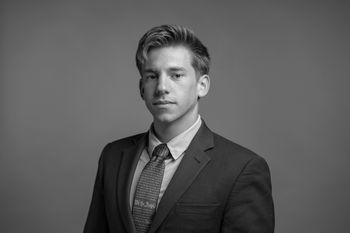DR MARSCHALL: Graduate schools hold the key to universities' free expression problem
Campus Reform Editor in Chief Zachary Marschall, PhD, spoke on a panel about how administrators are hijacking the college experience.
'There is a lack of curiosity that is debilitating in graduate programs across the country,' Marschall said.
Campus Reform’s Editor in Chief, Dr. Zachary Marschall explained the underlying causes of the dysfunction increasingly associated with American universities during a Monday panel titled “The Unsocial Network: How Administrators Hijack the College Experience.”
Dr. Marschall, who is also an adjunct assistant professor at the University of Kentucky, argued that universities are “infantilizing” students “through the lowering of academic standards.” He noted that this creates a contradictory college experience, as students are simultaneously required to be “perfected, molded adults” who are not allowed to make mistakes when it comes to administrators monitoring so-called politically correct speech.
The discussion at the National Press Club in Washington, DC, largely focused on how college and university bureaucrats hinder students’ free expression, free association, and rights to due process on campuses. Foundation for Individual Rights and Expression’s (FIRE) Chief Legal Counsel Robert Corn-Revere moderated the discussion.
[RELATED: MARSCHALL: Liberal bias on campus does not just happen]
In response to whether or not any policies or structures are in place to assure that colleges remain “value-neutral” and do not stifle freedom of expression, Marschall noted another, often overlooked aspect of the dynamic at American universities:
“I think the key to that is something we haven’t talked about yet, and that’s what’s going on in the graduate programs,” Marschall said. “There is a lack of curiosity that is debilitating in graduate programs across the country.”
This is because students usually pick and choose the university that conforms to their identities, Marschall explained.
Because graduate students include teaching assistants and instructors, Marschall said that if there were a way for trustees or administrations to examine how graduate faculty and students act as a “self-reproducing pool of grievance-driven scholars that lack curiosity about other people,” it would then be possible to “reverse that trend and then you can introduce viewpoint-neutral [values] back into universities.”
Marschall was joined by Palladium Magazine journalist Ginevra Davis, Free Press reporter Francesca Block, and American Council of Trustees & Alumni Paul & Karen Levy Fellow in Campus Freedom Dr. Steve McGuire.
Corn-Revere’s questions also addressed how the government’s response to the COVID-19 pandemic affected the college experience nationwide.
Davis referenced her time at Stanford University in her answer. “COVID was weirdly a wake-up call in terms of being a significantly better experience at my time at Stanford,” she said. “They really reframed my college experience as being very abnormal.”
Block—who attended Princeton University from 2018-2022—said that she saw the university administration interfere in nearly all aspects of student life.
“Things were so tense on campus that kids would barely leave their rooms,” she said.
“This is the exact kind of thing you hear about in the free expression space in general,” McGuire added.


